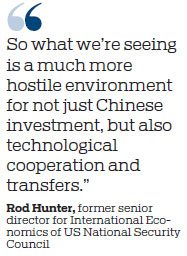Mounting uncertainty for Chinese investors
A new US law that tightens scrutiny of foreign investment has created a "much more hostile environment" for Chinese investors, and its definition of what is sensitive has increased uncertainties, two former senior officials said on Thursday at the launch of a report on China's outbound capital flows.
Driven by regulatory changes, Chinese foreign direct investment flows into North America and Europe dropped by $80 billion last year to $30 billion - a six-year low, with the US experiencing most of the downturn, according to law firm Baker McKenzie's latest report, Chinese FDI: A New Reality.
Passed by Congress and signed by US President Donald Trump in 2018, the Foreign Investment Risk Review Modernization Act greatly expanded the scope of investment reviews by the Committee on Foreign Investment, or CFIUS, in the United States. The interagency committee covers a wider range of transactions involving potentially sensitive sectors.

"New US investment screening rules are making life more difficult for Chinese investors," Rod Hunter, former senior director for International Economics of US National Security Council, said in the Baker McKenzie report.
Meanwhile, hardening relations between the two powers are weighing on investor sentiment.
Speaking at a panel discussion at the Atlantic Council in Washington on Thursday, Hunter, now a Baker McKenzie partner, said the part of the US policy played in driving the change in China's Foreign Direct Investment, or FDI, in the US was very important.
In addition to the Risk Review law, new export control reform legislation now requires the Commerce Department to determine what is an "emerging technology" and decide whether licensing to Chinese organizations is allowed.
"People focused on Huawei, but there was also an executive order, which creates the possibility for the administration to block US persons to use of Chinese technology in their own systems," he said.
"So what we're seeing is a much more hostile environment for not just Chinese investment, but also technological cooperation and transfers," Hunter said.
Deterring investment
Kurt Campbell, former assistant secretary of state for East Asian and Pacific Affairs, said, "I believe what's happening is that the definition of what is sensitive is broadening, broadening in ways that make it difficult for investors to predict." Campbell is now chairman and CEO of The Asia Group.
It not only involves necessarily Chinese businesses, but also other investments, Campbell said.
Campbell said the much more stringent approach will deter investment.
"You have agencies inside the US government playing their traditional roles, suspicious of everything, others much more freewheeling. I think over time, the tendency is to err on the side of caution or to reject," he said.
If companies have to wait for long and will be subject to the public scrutiny that increasingly comes with serious delineation, "a lot of times those companies, those investment committees are going to say no", Campbell said.
huanxinzhao@chinadailyusa.com
(China Daily 06/10/2019 page12)














